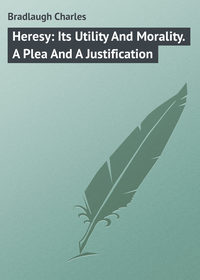
When Were Our Gospels Written?
The very latest contribution from orthodox sources to the study of the Gospels, as contained in the authorised version, is to be found in the very candid preface to the recently-issued revised version of the New Testament, where the ordinary Bible receives a condemnation of the most sweeping description. Here, on the high authority of the revisers, we are told that, with regard to the Greek text, the translators of the authorised version had for their guides "manuscripts of late date, few in number and used with little critical skill." The revisers add what Freethinkers have long maintained, and have been denounced from pulpits for maintaining, viz., "that the commonly received text needed thorough revision," and, what is even more important, they candidly avow that "it is but recently that materials have been acquired for executing such a work with even approximate completeness." So that not only "God's Word" has admittedly for generations not been "God's Word" at all, but even now, and with materials not formerly known, it has only been revised with "approximate completeness," whatever those two words may mean. If they have any significance at all, they must convey the belief of the new and at present final revisers of the Gospel, that, even after all their toil, they are not quite sure that god's revelation is quite exactly rendered into English. So far as the ordinary authorised version of the New Testament goes – and it is this, the law-recognised, version which is still used in administering oaths – we are told that the old translators "used considerable freedom," and "studiously adopted a variety of expressions which would now be deemed hardly consistent with the requirements of faithful translation." This is a pleasant euphemism, but a real and direct charge of dishonest translation by the authorised translators. The new revisers add, with sadness, that "it cannot be doubted that they (the translators of the authorised version) carried this liberty too far, and that the studied avoidance of uniformity in the rendering of the same words, even when occurring in the same context, is one of the blemishes of their work." These blemishes the new revisers think were increased by the fact that the translation of the authorised version of the New Testament was assigned to two separate companies, who never sat together, which "was beyond doubt the cause of many inconsistencies," and, although there was a final supervision, the new revisers add, most mournfully: "When it is remembered that the supervision was completed in nine months, we may wonder that the incongruities which remain-are not more numerous."
Nor are the revisers by any means free from doubt and misgiving on their own work. They had the "laborious task" of "deciding between the rival claims of various readings which might properly affect the translation," and, as they tell us, "Textual criticism, as applied to the Greek New Testament, forms a special study of much intricacy and difficulty, and even now leaves room for considerable variety of opinion among competent critics." Next they say: "the frequent inconsistencies in the authorised version have caused us much embarrassment," and that there are "numerous passages in the authorised version in which… the studied variety adopted by the Translators of 1611 has produced a degree of inconsistency that cannot be reconciled with the principle of faithfulness." So little are the new revisers always certain as to what god means that they provide "alternative readings in difficult or debateable passages," and say "the notes of this last group are numerous and largely in excess of those which were admitted by our predecessors." And with reference to the pronouns and other words in italics we are told that "some of these cases… are of singular intricacy, and make it impossible to maintain rigid uniformity." The new revisers conclude by declaring that "through our manifold experience of its abounding difficulties we have felt more and more as we went onward that such a work can never be accomplished by organised efforts of scholarship and criticism unless assisted by divine help." Apparently the new revisers are conscious that they did not receive this divine help in their attempt at revision, for they go on: "We know full well that defects must have their place in a work so long and so arduous as this which has now come to an end. Blemishes and imperfections there are in the noble translation which we have been called upon to revise; blemishes and imperfections will assuredly be found in our own revision;… we cannot forget how often we have failed in expressing some finer shade of meaning which we recognised in the original, how often idiom has stood in the way of a perfect rendering, and how often the attempt to preserve a familiar form of words, or even a familiar cadence, has only added another perplexity to those which have already beset us."
THE END.








